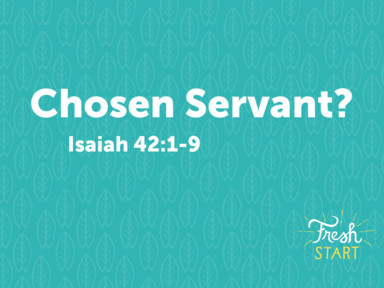Chosen Servant?

The Servant Belongs to God
The church today is raising a whole generation of mules. They know how to sweat and to work hard, but they don’t know how to reproduce themselves.
The young preacher thrilled his congregation with his first sermon—a challenge to “gird their loins” for Christian service and living. Then, to their dismay, he preached the same sermon the following Sunday. When he confronted them with the same ringing message on the third Sunday, his flock felt something must be done.
“Don’t you have more than just one sermon?” blurted a spokesman to the pastor.
“Oh, yes,” he said quietly, “I have quite a number. But you haven’t done anything about the first one yet!”
The Servant Is Committed to Justice
The 1999 crash of golfer Payne Stewart’s plane was a bizarre incident. He and five companions boarded a twin-engine, $2.4 million Learjet which left the runway at 9:19 A.M. There were two pilots, and all seemed fine when they checked in with air traffic controllers a few minutes later.
But for unknown reasons, the pilots apparently lost consciousness shortly before they were to turn west toward Dallas, and when they couldn’t be raised by air traffic controllers, two Air Force jets went aloft to investigate.
No one was at the controls. There was no movement in the cockpit, and the windows were fogged, suggesting that the cabin had depressurized and become chilled with stratospheric air some 45,000 feet above the earth.
One of the Air Force pilots said, “It’s a very helpless feeling to pull alongside another aircraft and realize the people inside that aircraft potentially are unconscious or in some other way incapacitated. And there’s nothing I can do physically from my aircraft even though I’m fifty to one hundred feet away, to help them at all.”
When one of its two engines finally ran out of fuel, the plane roller-coastered through the clouds, heading toward final, cataclysmic destruction.
One air safety investigator said that airplane depressurization can be “very insidious.” He explained that the problem could slowly deprive the crew of its ability to know what was happening. “It could be one of those things where you’re feeling good, you’re feeling happy, and you don’t know what’s going on.”
Picture humanity on a runaway airplane, on a collision course, with only moments of time remaining. Yet people are so caught up in their pleasures and pressures and pursuits that they don’t realize the urgency of their plight.
The Servant Is Motivated by Grace
John Marrant, a fourteen-year-old in Colonial Charleston, was converted through the preaching of George Whitefield, but his family disapproved of his new faith. John, dispirited, left home with only a small Bible and a little hymnbook in his pocket. He wandered through the wilderness several days, eating little and sleeping in trees for fear of beasts.
At length, he was seized by a Cherokee hunter. He asked me how I did live. I said I was supported by the Lord. He asked me how I slept. I answered that the Lord provided. He inquired what preserved me from being devoured by wild beasts? I replied, the Lord Jesus kept me from them. He stood astonished, and said, “You say the Lord Jesus Christ does this, and does that, and does everything for you; He must be a fine man; where is He?” I replied, “He is here present.” To this he made no answer.
Back in the hunter’s village, John was promptly condemned to death. The executioner showed me a basket of turpentine wood stuck full of small skewers. He told me I was to be stripped naked and laid down in the basket, and these sharp pegs were to be stuck into me, then set on fire, and when they burnt to my body, I was to be thrown into the flame, which was to finish my execution.
John immediately burst into prayer, and his pitiful words so moved the executioners they took him to the chief. Opening his little Bible to Isaiah 53, John read: “All we like sheep have gone astray; We have turned, every one to his own way; And the Lord has laid on Him the iniquity of us all.” Turning here and there in the Bible, John preached the gospel, converting among others the chief himself. For the next two years, the teenager remained among the Cherokees, preaching and teaching and making disciples.*
Conclusion: Am I living my life expecting others to serve me? My spouse? My children? The people at work? Or do I view those around me and my circumstances as opportunities to serve both Christ and others? Am I closed-fisted or open-handed? I don’t mean we will never receive and that we should never be served—there are times when that happens—but I’m talking about the passion of our life. Receiving or giving? There are also church implications. This morning many of us are in the receiving mode, but have you also come with a passion to give? To worship? To serve? Much of our culture is designed to make us feel good. The radical message of Jesus counteracts that. The greater message this morning is, “Who’s in control of my life? Why am I following Christ? What am I doing for Christ?” May the Lord Jesus take our lives and let them be consecrated, Lord, to Thee.
